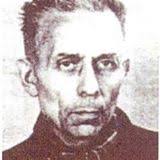Wilhelm "Willi" Jelinek, born on this day in 1889, was an anarchist revolutionary from Germany who survived the violence of the Third Reich and was imprisoned by Soviet authorities, dying in an East German prison in 1952.
Before World War II, Jelinek was involved with the anarchist journal "Proletarischer Zeitgeist" (English: "The Worker's Spirit"), a weekly, anti-authoritarian periodical which attempted to develop links between anarchists and the council communists. The paper did not continue past 1933 and, by the end of the war, only six of the organizers involved with it survived; twenty-seven had been murdered by the Gestapo.
After the war, Jelinek continued organizing with anarchists in East Germany, where he was critical of the Soviet state. In an unpublished pamphlet, written in 1947, Jelinek denounced the dictatorship of the proletariat "...which signifies the authority of the leaders. Where there is obedience, there are leaders who command". On November 10th, 1948, he was arrested by two Russian officers, and his son-in-law was arrested, disappearing without a trace.
Although temporarily released, Jelinek continued to associate with anarchists and was once again arrested, this time sent to Bautzen, an East German prison. Under mysterious circumstances, he died there on March 24th, 1952.
